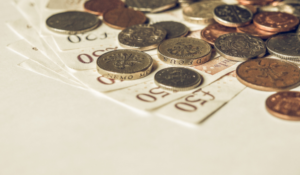 UK inflation rose to 1.5% in April 2021, up from just 0.7% in March, according to new data from the Office for National Statistics (ONS).
UK inflation rose to 1.5% in April 2021, up from just 0.7% in March, according to new data from the Office for National Statistics (ONS).
The increase marks the largest month-on-month growth in more than a decade, driven by climbing household bills and motor fuel costs as the UK economy emerges from the last coronavirus lockdown.
In this article, we break down the ways in which a rise in inflation could affect your day-to-day life, and what to expect over the next few weeks and months.
The cost of living is going up
The real-world implication of higher inflation means that, in simple terms, you can buy less with your money.
This is because the average price of goods and services - typically measured using the Consumer Prices Index (CPI), which takes a weighted average of prices across a basket of common consumer goods - has increased, whilst the value of the currency (in the UK's case, GBP) has failed to keep up, effectively resulting in a single unit of currency being able to buy less than it had in previous periods.
This discrepancy between the cost of goods and the value of a currency therefore amounts to a fall in its "purchasing power".
In terms of day-to-day life, this means that the cost of numerous products - be it groceries, household utility bills, clothing - has risen, so everyday expenditure will likely increase to accommodate this. This can manifest in a number of ways; You could begin to see your weekly shopping costs climb, or perhaps your energy bills will start to go up.
If your wage does not keep pace with inflation the cost of buying day-to-day goods will start to take up a larger proportion of your earnings, so in the future you could find yourself struggling to afford things that you previously could.
The new inflation data is concerning because it indicates that the price of basic consumer goods is increasing, and as the government begins to wind back its coronavirus income support schemes, more and more people could find themselves under financial strain if the trend for higher inflation continues.
If you're concerned about this increase in prices, you could try budgeting to help offset some of the excess cost. Visit our article "The best budgeting apps in the UK: How to budget without trying", or try our guide to "big picture" budgeting, for further information.
Interest rates and mortgage rates could rise
Although inflation was expected to rise this year, in doing so it could mean that the Bank of England (BOE) will need to raise interest rates as inflation nears the institution's official minimum inflation target of 2%, chosen as it is indicative of a healthy and growing economy.
In March last year, the BOE's Monetary Policy Committee (MPC) announced it was to reduce interest rates to a historic low of just 0.1% to support the economy as the COVID-19 pandemic took hold. At each subsequent meeting the MPC then voted unanimously to keep its base rate at 0.1%, however, with inflation surging back towards that all-important 2% target, the BOE could be forced to raise interest rates for the first time since the pandemic began.
Whilst there is still some way to go before inflation actually hits 2%, the sheer speed of the increase from March to April means that it could reach - or even surpass - the target by the end of the summer, while the UK economy is still navigating its first few months free from the last lockdown.
The reason this matters so much is because the BOE's base interest rates can have a significant impact on a number of aspects of personal finance, including mortgages, loans, pensions and savings.
For example, if interest rates rise, mortgage repayment rates rise too. And, if this increase in mortgage repayments coincides with other financial difficulties - such as unemployment, which is still hovering around the 4.8% mark as a result of the pandemic - it could become much more challenging to keep up with regular payments.
Damien's article "When will interest rates rise (or in fact be cut)? – Latest predictions" offers in-depth analysis on the direction of UK interest rates over the course of 2021, as well as guidance on what any changes in the Bank of England's base rate could mean for mortgage rates and repayments.
Is it all doom and gloom?
Although rising inflation has knocked the confidence of UK markets, the BOE has stated that - despite the recent uptick - it still expects inflation to settle at around 2% by next year, so there is little risk of an inflationary crisis any time soon.
Nevertheless, it may just be an unfortunate reality that interest rates could rise while many have yet to shake off the economic impact of the pandemic, and could find themselves saddled with heftier mortgage repayments before their wages have had a chance to catch up with the changes.
And, unless the sudden increase in inflation starts to peter out, the cost of a range of goods and services - fuel, in particular - may continue to rise, so daily expenditures such as petrol or utility bills could hike even further over the next few months.
This may be less of an issue while coronavirus support schemes are ongoing, but once these begin to trickle away during the summer months, money could start to seem a little bit tighter.
One silver lining is that if the BOE raises its interest rate then savings rates should start to rise. However, history tells us that there is a usually lag between BOE interest rate rises and banks and building societies increasing the interest rates on their savings accounts.





